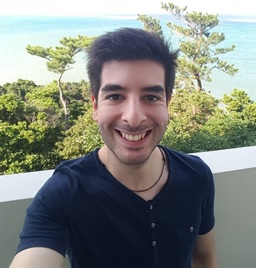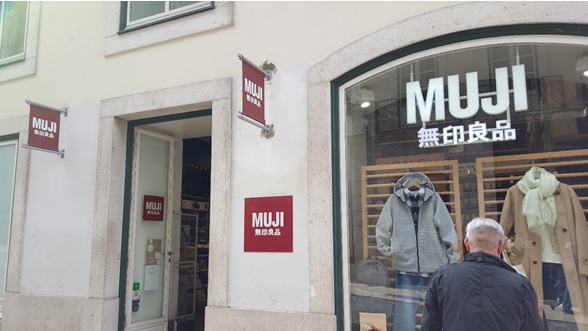 パブロ・アドリアン・ギジェン・ポザ
パブロ・アドリアン・ギジェン・ポザ
生命科学専攻 博士後期課程 3年
Universidade Nova de Lisboa, Caparica, Portugal
2020/02/04 – 2020/03/15
Dear colleagues,
My name is Pablo Guillen and I am a 3rd year Ph.D. student at Hokkaido University. I belong to the Transdisciplinary Life Science course, and I specifically have been working in Professor Shin-Ichiro Nishimura’s lab.
My actual research is about unnatural glycopeptide synthesis for cancer immunotherapy. Briefly, I make small proteins with sugars attached to them, and we use these new compounds in a microarray platform (Figure 1) to detect cancer development.
 Figure 1. Principle of microarray platform. A) Peptide attachment to the slide. B) Antibody binding to specific peptide sequences. C) Analysis. Picture obtained from Creative Biolabs.
Figure 1. Principle of microarray platform. A) Peptide attachment to the slide. B) Antibody binding to specific peptide sequences. C) Analysis. Picture obtained from Creative Biolabs.
It is very important for my research to understand how my compounds interact with antibodies and other carbohydrate binding proteins as lectins. Therefore, I decided to join Filipa Marcelo’s group for 41 days. During my research stay in NOVA University Lisbon I had the opportunity to work on nuclear magnetic resonance spectroscopy (NMR) studying the binding process of my compounds.
The NOVA University Lisbon campus is located very close to the sea and just ten minutes by train from Lisbon, the capital of Portugal. I was very lucky with the student dormitory I stayed because it was inside the campus so I didn’t have to commute to go to the lab.
I arrived in Portugal some days before I joined the lab to settle down and recover from jet lag. The flight was very long, more than 20 hours because I had to make stopovers in Tokyo and Doha and the local time in Portugal is 8 hours earlier than Japan’s. I joined the Faculty of Science and Technology and started to work as soon as possible in the lab under the supervision of Dr. Filipa Marcelo and several Ph.D. students. They helped me a lot to get along with to the techniques I will have to use. I started to learn and practice to get confident enough to conduct the experiments with my actual compounds when they arrive from Hokkaido University. The results I got from my research were very promising and that allowed me to research further in some aspects, opening the possibility of new studies.
 Figure 2. (Bio)molecular structure and interactions by NMR group.
Figure 2. (Bio)molecular structure and interactions by NMR group.
As you can see, the group I was working with is very big and it took me some time to remember all the names but all of them were amazing. They were really kind with me and were always ready to help me anytime. We used to have lunch breaks together and discuss over our research, how different is the live in Portugal and Japan or just about our lives. I really treasure those moments because that’s how I created stronger bonds with them, made a lot of friends and started the first steps for future international research collaborations. I also had the opportunity to assist some lectures about NMR, Ph.D. and Master student presentations regarding their research and their next steps, and I even had the chance to present the research I have been conducting in Hokkaido University.
Because I was so close to Lisbon, I used to take advantage of my free time to do some sightseeing and also visit some iconic places around the city. My favorite place in Lisbon was the Praça do Comércio (Commerce Square), next to the Targus river. A beautiful square, always full of people and life.
 Figure 3. Praça do Comércio, Lisbon.
Figure 3. Praça do Comércio, Lisbon.
The weather in Lisbon was very different from Sapporo but still a little cold, around 10 ºC, but that never stops people going outside and enjoying sunny days. Also, while I was doing some tourism, I was surprised to find some Japanese brands around the place.
 Figure 4. Japanese brand around Portugal.
Figure 4. Japanese brand around Portugal.
Just as a closing remark, I want to mention that this experience not only helped me to learn a lot about science, but also about how to work in a new group with new teammates and how to interact with other researchers. I started a valuable research network. It helped me to approach my research from a different angle and it improved its quality. I think that experiences like this one are really beneficial for any researcher so I would totally recommend to Ph.D. students to try an international internship.
Finally, I would like to thank the Faculty of Advanced Life Science for making possible this internship with the support for traveling abroad program.
Best regards,
Pablo Guillen